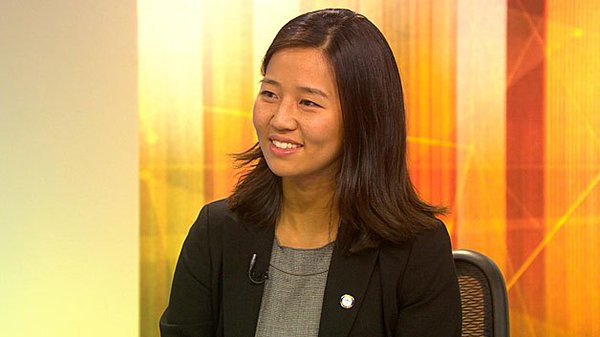By Cassidy DeStefano, news editor
Newly inducted City Council President Michelle Wu is no stranger to politics. A former assistant to big-name Massachusetts public figures – Senator Elizabeth Warren and former Mayor Thomas M. Menino, among others – Wu built her political resume before becoming the first Asian-American woman to serve on the city council in 2014. The News spoke to Wu about her future plans for Boston.
The Huntington News: How long have you been working with the City of Boston?
Michelle Wu: I was first elected in 2013 and then sworn in in 2014, so two years.
HN: Since being with the council, what are some of the initiatives you have engaged in?
MW: One of the things I’m proudest of accomplishing last term is working with my colleagues and the mayor to pass paid parental leave in Boston. I also worked with everyone to pass an ordinance guaranteeing equal healthcare access for transgender city workers.
HN: It sounds like you’ve worked a lot on social issues.
MW: Those are the two biggest pieces of legislation that I sponsored and introduced to pass. But there are a whole bunch of other things in the works about simplifying processes and making things more transparent for people, whether you’re trying to open a small business in Boston or just trying to find out information about when the city council meetings are held.
HN: As president, how do you plan to advance the agenda of the council?
MW: The biggest focus is on transparency. In the last term, I started issuing the city council meeting notes after every meeting just so people could find all of that information in one place. I really want to push that further with redesigning the council website and making all of our documents and processes accessible to people.
HN: Why is transparency important?
MW: Today, government works best when they partner with residents, organizations and businesses outside of the government. Government really needs to focus on inviting people in to help us innovate and implement. We have a lot of great energy in Boston, but fundamental to getting people involved is getting them informed.
HN: Our publication represents a college community. Do you have any plans to further integrate universities into city affairs?
MW: Our colleges and universities are one of our greatest resources in Boston. At the most basic level, we need to be connecting with more students and giving them opportunities to experience government up close. One goal I have for this year is to establish a thriving internship program for the council as a whole. We also need to keep engaging on the social issues that student voices can really help drive. There’s a lot of work that needs to be done in terms of housing and making sure that Boston is affordable, so that students who want to stay in the city after graduation can afford a place to live. There’s work to be done around transportation, jobs and making sure that the city is a fun and vibrant place with a thriving arts and culture scene, restaurants, late-night entertainment, etc.
HN: A lot of the issues that you mentioned directly concern income. A recent Brookings Institution study lists Boston has the No. 1 city in America for income inequality. How will you combat that?
MW: We have a lot of work to do. It reflects the fact that Boston is an attractive city where people want to come live. And there are opportunities and new jobs being created. But this growth really has to include everyone. So for that reason, we have a lot of work to do in making sure that we’re a city where people from all backgrounds and income levels can comfortably live.
HN: We understand that Mayor Martin J. Walsh is delivering a state of the city address [Tuesday night], with a particular focus on Boston Public Schools. What kind of reforms do you hope to implement in school systems, especially charter schools?
MW: That falls to the work of our education committee. I think our role as a council is to really make sure that we are advocating for parents and providing a voice for families in that office.
HN: In two years when you’re looking back on your term as president, what changes do you hope have been implemented?
MW: I hope to see a website that lets people find anything they want to find out about the council’s work, as well as a council that is effective, substantive and productive for all residents.
Photo courtesy AAJC, Twitter















